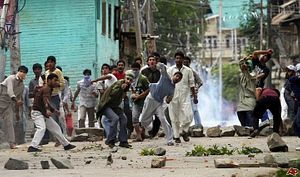Over the weekend the decades old conflict between India and Pakistan erupted in the volatile region of Kashmir. Seventeen Indian soldiers were killed when gunmen launched a pre-dawn raid on an Indian military base located in Uri, Kashmir. The attack was one of the deadliest in years, and comes at a time of increased tension between the two nuclear powers.
Pakistani Prime Minister Nawaz Sharif is due to give a speech before the UN General Assembly this week in an effort highlight Indian abuses of Kashmiri citizens and to reinforce the international community’s pledge for Kashmiri independence.
The conflict in Kashmir is convoluted to say the least, and begs the question as to why India and Pakistan continue to fight so ferociously over such a small piece of territory.
Since the partition and independence of India and Pakistan in 1947, the two heavyweights have fought three wars over the tiny region.
As India and Pakistan went their separate ways, states still governed under principalities had the option of which side to take. Maharaja Hari Singh, the Hindu ruler of Kashmir, presided over a population of predominately Muslim subjects, and as such decided to remain neutral, unable to make a choice between India and Pakistan.
In an effort to force a decision and lay claim to the area, Pakistan sent armed tribesmen into the region, provoking Hari Singh to seek out military assistance from India. The resulting confrontation would become the first Indo-Pakistan war from 1947-48.
India sought out UN assistance to mediate the conflict, which temporarily led to a ceasefire and the holding of a direct vote by the people. As India was expected to win the vote, Pakistan continued its attack until 1949, when a ceasefire was agreed to and today’s de facto border (known as the Line of Control) was established, with India controlling 65 percent of the territory.
Two more wars would be fought between India and Pakistan, the second Indo-Pakistan war in 1965 and the Kargil conflict in 1999. Today, currently three countries lay claim to various parts of Kashmir. India administers Jammu, the Kashmir Valley, Ladakh, and the Siachen Glacier; Pakistan administers Azad Kashmir and Gilgit-Baltistan; while China administers Demchok district, the Shaksgam Valley, and the Aksai Chin region.
The conflict in Kashmir is not just between Pakistan and India, but also between militant groups in the region seeking autonomy from Indian rule. Those groups include Hizbul Mujahideen, the Jammu and Kashmir Liberation Front, which seeks independence for Kashmir, and Pakistan-based Lashkar-e-Taiba (LeT), a terrorist group with connections to Islamabad and the 2008 Mumbai attacks.
However, sectarian divisions and political ideology only provides half the answer to the conflict in Kashmir. Why is Kashmir so important to India, Pakistan, and China?
The answer is the glaciers and fresh water they provide to the region and to India. The glacial waters that flow through Kashmir provide water and electricity to a billion people in India. Pakistan also relies heavily on glacial waters flowing from the region to prop up its agricultural sector.
With a growing population and increased need for electricity, India has looked to the region to develop more hydro facilities. Pakistan fears that India may divert water necessary for irrigation, and use water as a weapon against Pakistan.
Kashmir is thus a major national security issue for both nations, the control of which could pose an existential threat to the other.
In 1960, India and Pakistan signed the Indus Waters Treaty, brokered by the World Bank. The agreement gave India control over the Beas, Ravi and Sutlej rivers, and Pakistan control over the Indus, Chenab, and Jhelum. Because all the rivers flowed through India, India was given special provisions for hydroelectric development.
Sounding further alarm bells, research indicates that global warming is causing record melting of Kashmir’s glaciers, which provide fresh water to its rivers. Himalayan glaciers have lost an estimated 174 gigatons of water; the rapid melt has been responsible for severe flooding in both Pakistan and India. With rapidly receding glacial water, India and Pakistan will face prolonged electricity shortages, stunting economic growth, and dry summer river beds will impact the agriculture sector.
Kashmir is geostrategically located and serves as main source of water and power generation for both Pakistan and India. The control of the region creates a zero sum game in which the control of the rivers and glacial water could pose an existential threat to the other.
































